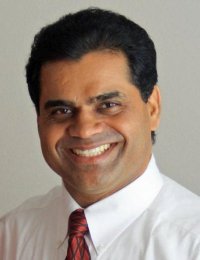He’s the new Fort Bend County Judge.
In December, that strange suspended-in-motion month between his election and taking office, K.P. George was checking out the quaint old domed Fort Bend County Courthouse, soon to be his domain. In November, to the surprise of almost everyone outside his campaign, George had been elected Fort Bend’s county judge — which is to say, the top boss of one of the United States’ fastest-growing counties, with 765,000 residents, nearly 3,000 employees, and an annual budget over $370 million.
When George takes office on Jan. 1, he’ll become arguably the most powerful Indian-American in U.S. government — as well as a potent symbol of the new Fort Bend, and of Asian-Americans’ growing power in Texas and American politics.
[…]
And still, to most political insiders, George’s election came as a surprise. “He was not someone on our radar,” said Gautam Raghavan, executive director of the Indian-American Impact Fund. “It wasn’t a race we engaged in. In hindsight, that’s a lesson for us: In some of these places with fast-shifting demographics, like the Texas suburbs, there are huge opportunities for us.”
“For Republicans in Fort Bend County, Donald Trump is a real liability,” [Rice poli-sci professor Mark] Jones said. “Socially and fiscally conservative Asian-Americans used to vote for more Republicans. But Trump’s rhetoric and policies are seen as anti-immigrant — anti-Latino, but also anti-Asian.”
“Many Trump administration policies, such as targeting Muslims as terrorists, don’t play well with Asian-Americans…. Indian-Americans may not love Pakistanis, but the same racial discrimination that targets Pakistanis targets them.
“In Fort Bend, there was a double whammy for Republicans. A much larger proportion of Asian-Americans voted for Democrats, and Asian-Americans also turned out at a much higher rate than they had previously.”
Observers have long predicted that Texas’ changing demographics will eventually turn the most Republican of states into one that’s more bipartisan or even reliably Democratic. That’s already true of Texas’ cities. Now the battles have shifted to the suburbs.
Notably, George is a Democrat. “It’s a historic election for Texas,” said Jones — Fort Bend is the first exurb to elect a Democrat to the top of its county government. “It could portend the future for diverse counties such as Denton and Collin.”
I’m honestly surprised that this race wasn’t on the radar of any national organizations like the Indian-American Impact Fund. George was not a novice politician – he’d been twice elected to the Fort Bend ISD board of trustees. Fort Bend had been trending Dem for some time, and fit in every way the profile of the suburban, diverse, won-by-Hillary-in-2016 Congressional districts that were so hotly contested. Outgoing Judge Bob Hebert had served for a long time, but didn’t have the bipartisan cred that Ed Emmitt had, which might have helped him ride out the wave. This race should have been seen as a prime opportunity, and if it wasn’t that was a failure of imagination.
And yes, I believe this is a leading indicator for other suburban counties. Williamson County didn’t elect anyone countywide despite being carried by Beto O’Rourke, MJ Hegar, and Justin Nelson, but it did elect two Democratic State Reps and two JPs, while a Dem County Commissioner candidate fell just short. Dems didn’t carry any race in Denton or Collin, but elected a State Rep in Denton while just missing on two in Collin, and a JP in Denton County. It was a big step forward. There are no guarantees for 2020, of course, but the obstacle of credibility – the belief that it’s really possible a Dem could win – has been cleared. That can only help.


Given that Kamala Harris has an Indian mother, she’d probably, if she saw this, argue with the Chronic on very good grounds that its assessment of George as the most powerful Indian-American in US government is wrong.
The article did address this:
“K.P. George is now the most prominent Indian-American to hold an executive position in U.S. government,” said Rice professor Mark Jones.
The word “executive” is an important qualifier: California Sen. Kamala Harris, discussed as a presidential candidate, is far more visible, and there are also Indian-Americans in the House of Representatives. As governors, Nikki Haley and Bobby Jindal each held more power — but neither currently holds an executive, buck-stops-here job.